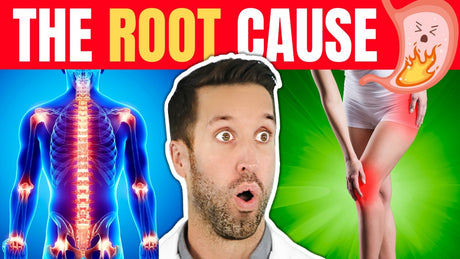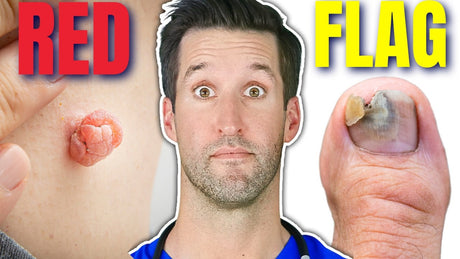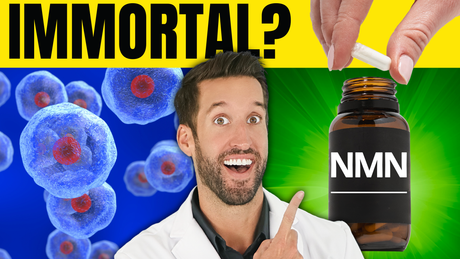Your body is a remarkable machine, constantly working to keep you healthy and balanced. But sometimes, it sends subtle (or not-so-subtle) signals when something is off. Ignoring these signs can lead to bigger health issues down the road. Here are 10 crucial body warning signs that you should never ignore, as they could be your body's way of begging for some extra care.
1. Persistent Fatigue
Are you feeling tired all the time, even after a full night’s sleep? This could be more than just a busy lifestyle taking its toll. Persistent fatigue might indicate an iron deficiency, which is essential for producing hemoglobin—the protein in your blood that carries oxygen. Low iron levels can lead to anemia, causing you to feel exhausted and weak.
Tip: Include iron-rich foods in your diet, such as lean meats, beans, and spinach. If you suspect anemia, consult your doctor for a blood test.
2. Frequent Infections
Do you find yourself constantly battling colds or infections? Frequent illnesses can be a sign of Vitamin C deficiency. Vitamin C is a powerful antioxidant that plays a vital role in supporting your immune system. Without enough of it, your body might struggle to fight off infections.
Tip: Boost your Vitamin C intake with foods like citrus fruits, strawberries, and red bell peppers, or consider a supplement to keep your immune system strong.
3. Muscle Cramps
Muscle cramps can be incredibly painful and are often a sign that your body is low on magnesium. Magnesium is responsible for over 300 biochemical processes, including muscle function. Without adequate magnesium, your muscles can’t function properly, leading to cramps and spasms.
Tip: Incorporate magnesium-rich foods like nuts, seeds, leafy greens, and whole grains into your diet. If you’re still experiencing cramps, a magnesium supplement might help.
4. Dry Skin
Is your skin dry, flaky, and dull? This could be due to a lack of Omega-3 fatty acids, which are crucial for maintaining skin moisture and elasticity. Omega-3s also have anti-inflammatory properties that can help soothe irritated skin.
Tip: Increase your intake of Omega-3s by eating fatty fish, chia seeds, and walnuts. If you’re not getting enough through diet alone, consider an Omega-3 supplement.
5. Hair Loss
Sudden or excessive hair loss can be alarming and may signal a Vitamin D deficiency. Vitamin D is essential for healthy hair follicles, and a lack of it can lead to hair thinning or loss.
Tip: Make sure you’re getting enough sunlight, which helps your body produce Vitamin D. You can also find it in fortified foods or take a supplement to maintain healthy levels.
6. Poor Night Vision
Do you have trouble seeing at night or in low-light conditions? Poor night vision could indicate a Vitamin A deficiency. Vitamin A is crucial for maintaining good vision, particularly in dim lighting.
Tip: Foods rich in Vitamin A, such as carrots, sweet potatoes, and dark leafy greens, can help improve your night vision.
7. Mood Swings
Feeling irritable or experiencing unexplained mood swings? This could be due to a lack of B Vitamins, particularly B6, B9 (folate), and B12, which are essential for brain health and mood regulation.
Tip: Include more B Vitamin-rich foods in your diet, such as eggs, fish, and leafy greens. If your diet alone isn’t cutting it, a B-complex supplement could be beneficial.
8. Bleeding Gums
Bleeding gums when brushing your teeth might be more than just a dental issue—it could be a sign of Vitamin C deficiency. Vitamin C is important for gum health and helps prevent gum disease.
Tip: Increase your intake of Vitamin C through fruits like oranges, kiwi, and strawberries, or consider a supplement to ensure your gums stay healthy.
9. Bone Pain
Experiencing bone pain or weakness? You might be lacking calcium, which is crucial for maintaining strong bones. Calcium deficiency can lead to osteoporosis, making your bones more prone to fractures.
Tip: Ensure you’re getting enough calcium from sources like dairy products, green leafy vegetables, and fortified foods. Remember, Vitamin D is essential for calcium absorption, so make sure you’re getting enough of both.
10. Brain Fog
Struggling with concentration and memory? Brain fog can be frustrating and may indicate a deficiency in Omega-3 fatty acids or B Vitamins. These nutrients are vital for cognitive function and mental clarity.
Tip: To enhance cognitive function, consider incorporating Omega-3-rich foods like fish and walnuts into your diet, or try a supplement. For a quick brain boost, you might want to check out 'LEVEL UP' by Life Happns, which contains Vitamin B12, Niacin, Cordyceps, and Organic Lion's Mane Mushroom Extract.
Conclusion
Listening to your body is essential for maintaining optimal health. If you’re experiencing any of these warning signs, it might be time to give your body the extra attention it needs. Simple dietary changes, lifestyle adjustments, and the right supplements can make a significant difference in how you feel and function daily. Always consult with a healthcare provider if you’re concerned about any symptoms or deficiencies.
---
References
- National Institutes of Health (NIH). Iron: Fact Sheet for Health Professionals.
- Carr, A.C., & Maggini, S. (2017). Vitamin C and Immune Function. Nutrients, 9(11), 1211. doi:10.3390/nu9111211.
- Barbagallo, M., & Dominguez, L.J. (2010). Magnesium and Aging. Current Pharmaceutical Design, 16(7), 832-839. doi:10.2174/138161210790883615.
- Bottiglieri, T. (2005). Homocysteine and Folate Metabolism in Depression. Progress in Neuro-Psychopharmacology and Biological Psychiatry, 29(7), 1103-1112. doi:10.1016/j.pnpbp.2005.06.008.
- Chapple, I.L.C. (1997). Reactive oxygen species and antioxidants in inflammatory diseases. Journal of Clinical Periodontology, 24(5), 287-296. doi:10.1111/j.1600-051X.1997.tb00766.x.
- Institute of Medicine (US) Committee to Review Dietary Reference Intakes for Vitamin D and Calcium. (2011). Dietary Reference Intakes for Calcium and Vitamin D. Washington (DC): National Academies Press (US). doi:10.17226/13050.
- Freund-Levi, Y., et al. (2006). Omega-3 fatty acid treatment in 174 patients with mild to moderate Alzheimer's disease: OmegAD study: a randomized double-blind trial. Archives of Neurology, 63(10), 1402-1408. doi:10.1001/archneur.63.10.1402.
All information on the Life Happns website is for informational purposes only, and is not intended to be used for medical advice, diagnosis, or treatment. Always seek the advice of your physician or other qualified health provider with any questions you may have regarding a medical condition or before starting any new supplement or health regimen.








